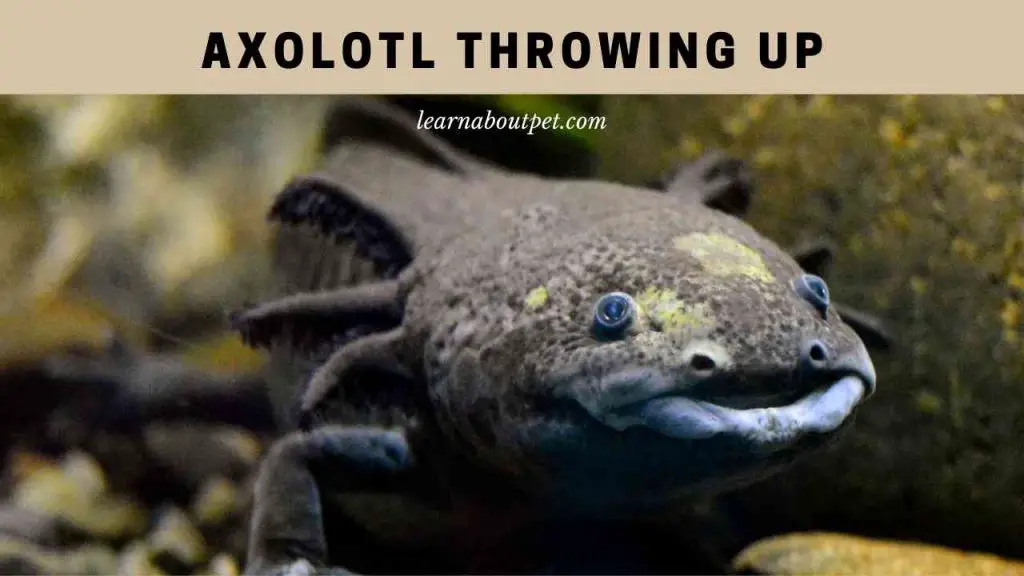Giving the best care for axolotls is something that every aquatic pet owner must do. Axolotl needs such as water requirements, tank space, and proper diet must be prioritized, considering the axolotl is a critically endangered animal. Sometimes we don’t know what condition is happening to our axolotl.
Is your Axolotl throwing up? Axolotl can vomit for a few reasons. Poor food quality, ammonia poisoning, impaction, overeating, and wrong water temperatures make axolotl vomit their food. Although some causes are less serious, we should not underestimate them.

If you have never experienced axolotl vomiting, you have come to the right place. Let’s read this article to the end to discuss details about axolotl vomits.
Do Axolotls Vomit?
Axolotls do vomit. You don’t need to be confused when axolotl throwing up because some things that cause vomit can be solved. The most common cause is poor quality food. The axolotl swallows its food immediately. If the food is not fit to eat, the axolotl will react and can get sick from it.
Is my axolotl sick? The only cause of the axolotl vomiting due to pain is the impaction symptom. In addition, the cause of axolotl vomiting is how the owners take care of their axolotls, such as water requirements and food provided.
New axolotl owners will be confused if they see their axolotl regurgitate. Try to calm down and look for the cause. Do not try to take the axolotl in the tank, but try to check the conditions around the axolotl.
Why Does My Axolotl Vomit?
Try to check what food you gave the axolotl the last time. If you provide commercial pellets, check the pellets’ condition whether they are still suitable for your pet or if they have been damaged. Food with poor quality makes axolotl unable to process it. Just like humans swallowing bad food.
My axolotl just threw up because I carelessly gave out expired and dried-out pellets. After I consulted the vet, I let the axolotl recover until his condition recovered, then I gave him live food for the next two weeks.
Can axolotls vomit? Axolotl throwing up is not only due to bad food, but axolotl’s environment can also be the cause. Try to check the water level and water change to solve the problem.
Why Is My Axolotl Throwing Up?
Try checking how your axolotl behaves when you vomit. The axolotl dry heaving after vomiting 10 minutes ago and stayed like that for another minute or two. After the axolotl calmed down, I checked the food.
The bloodworm is not a problem and looks fresh. Then I checked the water level, and I found the ammonia was rising. Immediately I moved the axolotl to another tank and did a water change.
The water change was finished, and I put the axolotl back into the tank. I let it not feed for a few hours because I was afraid of a side effect after the axolotls threw up their food.
Six hours later, I saw that the axolotl ate bloodworms without any problems. I concluded that axolotls vomit due to high ammonia levels. Either it’s because the axolotl can’t stand ammonia, or my axolotl got a bit of ammonia poisoning.
Do Axolotls Regurgitate?
Axolotl spits out food or regurgitates if they want to adjust the food alignment in their mouth. Try to give axolotl food a bite-size. The axolotl will be challenging to swallow If you provide the large worms. Sometimes vomiting axolotl occurs because the food is turning bad, or their digestion rate is slowing down.
Adult axolotls only eat every two to three days. Do not feed axolotls too often, as they can easily overfeed. If there is still food in their digestive system that has not been processed, the axolotl will vomit because it can’t be put in new food.

Axolotl Threw Up Earthworms, Is That Normal?
Axolotls are opportunistic feeders. They will look excited when live food enters their tank. Even if they are full, axolotls will not hesitate to add food until they are barfed.
If axolotl throws up worms, something might happen. Axolotl loves various types of worms when served live. Axolotls do not usually throw up any worms unless several factors such as poor water quality or poor worm conditions.
Try to count how many times axolotl throws up worms. If you count more than 3 times, consult a vet for your axolotl condition. Axolotl vomit is not normal if they have regular feeding times and good water quality.
What Does Axolotl Vomit Look Like?
Axolotl vomits are shaped according to what they eat. If axolotls eat earthworms, sometimes they vomit part of what they eat. Axolotl throws up with a shape like dust and black. Axolotl vomiting is due to many things, such as poor water conditions, stress, or illness.
Sometimes axolotl owners want to give the best for their pet but don’t see the possibility that axolotl can get sick from overeating.
Try to measure how much food is suitable for the axolotl, and only give it two to three times a day for adults. Feeding too often will waste food and pollute the aquarium faster.
Why Is My Axolotl Vomiting All Of Their Food?
There are two possibilities for axolotl throwing up everything you give to them. Either the lights were too bright facing them, or the water was too cold. Temperatures that are not right stress axolotls and refuse anything they eat.
Axolotl remains hungry but can’t rest easy to enjoy their food because conditions are not what they want. Axolotl throwing up worms even though I prepared it fresh. It turned out that the temperature in the tank did not match their needs between 16-18° Celsius.
After I tried giving the heater to regulate the temperature in the tank, I saw the axolotls starting to enjoy their food. Always try to check the temperature in the tank because the axolotl has specific requirements.
Axolotl Sick Symptoms
Every owner doesn’t want to see axolotl regurgitating food. Recognizing the signs of axolotls when they are sick will help owners to treat them as quickly as possible and provide them with whatever they need. The table below shows some of the symptoms that indicate an axolotl is sick.
| Sick axolotl | Explanation |
| Refusing to eat | Eating less or not eating at all whatever type of food you give. |
| Gills falling off | Bacterial or fungal infections on their skin. |
| Shedding slime coat | High toxicity water levels or due to stress. |
| Floating | Impaction, creating bubbles in their body, or frantic swimming. |
| Throwing up food | Overeating, bad food quality, or high ammonia levels. |
What Does A Sick Axolotl Look Like?
Axolotls will not be as active as usual and appear unresponsive even if you interact with them from the outside. They seem to lose weight drastically and refuse anything you give them.
My axolotl is throwing up due to ammonia poisoning. I was late for a water change which I usually do once a week. Axolotl looks limp and floating. The gills are curled, and that is a sign that the axolotl is under stress due to its surroundings.
Final Verdict – Axolotl Throwing Up
Axolotls can throw up their food due to several conditions. The thing that most often happens is poor quality food. Axolotls can’t stand turning bad tastes and spit up half of all of the food they eat.
Another possibility is that the axolotl is in a dirty tank, and the ammonia level is high. If allowed to continue, axolotls can be poisoned and worsen their condition.

Axolotls can vomit from overfeeding. Try to check their eating schedule, and try not to eat too fast. Axolotls won’t refuse the food you give them, but their stomachs can’t process too much food.
As a pet lover, make sure to learn about pet more and give your pet axolotl a good and comfortable life!

Welcome to Learn About Pet. My name is Rajkumar Ravichandran and I love all pets, travel, and amazing food. I write about my passion and personal experience caring for multiple pets in this blog! ❤️
Post Disclaimer
DISCLAIMER: THIS BLOG OR WEBSITE, "Learn About Pet", DOES NOT PROVIDE YOU WITH MEDICAL ADVICE AND IS NOT A SUBSTITUTE FOR MEDICAL ADVICE. ALWAYS GET IN TOUCH WITH YOUR PERSONAL VETERINARIAN AND USE INFORMATION HERE AS GENERAL ADVICE.
The information, including but not limited to, text, graphics, images and other material contained on this website are for informational purposes only. No material on this site is intended to be a substitute for professional veterinary advice, food recommendation, diagnosis, or treatment. Always seek the advice of your veterinarian or other qualified health care provider with any questions you may have regarding a medical condition or for pet food related questions.







